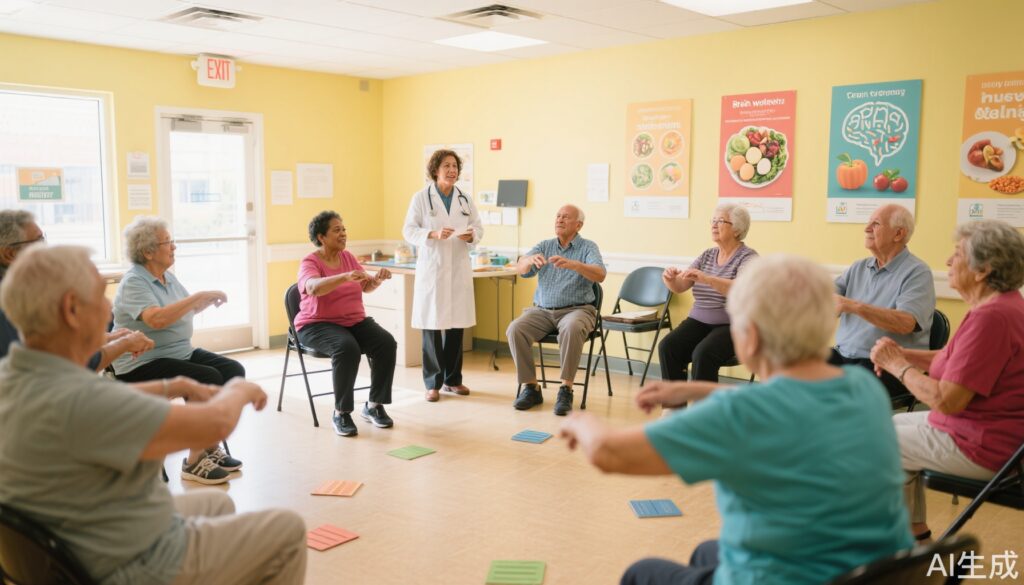Highlight
- Intensive, structured lifestyle modification yields statistically greater cognitive improvement compared to a less intensive, self-guided approach in older adults at risk for cognitive decline.
- Both structured and self-guided interventions produced measurable cognitive benefits over two years, indicating even modest lifestyle changes can be protective.
- Cognitive benefits were consistent across risk subgroups, including individuals with elevated cardiovascular risk and APOE4 carriers.
- The absolute cognitive gain, while statistically significant, leaves open questions about long-term clinical impact and scalability.
Background
Cognitive decline and dementia represent a mounting public health burden, with Alzheimer’s disease affecting nearly 7 million Americans and prevalence projected to rise as the population ages. Preventive strategies, especially those targeting modifiable risk factors, are urgently needed, as pharmacological options for dementia remain limited in their ability to halt or reverse disease progression. Epidemiological evidence suggests that physical inactivity, poor diet, cardiovascular risk, and social isolation are associated with higher dementia risk. However, robust clinical trial data supporting the effectiveness of multifaceted, real-world lifestyle interventions in high-risk US populations have been lacking.
Study Overview and Methodological Design
The US POINTER study (Protect Brain Health Through Lifestyle Intervention to Reduce Risk), presented at the 2025 Alzheimer’s Association International Conference and published in JAMA, is the first large-scale, randomized controlled trial in the United States to specifically examine whether comprehensive lifestyle modification can slow cognitive decline in older adults at increased risk.
A total of 2,111 sedentary adults aged 60–79 with suboptimal diets and at least two additional dementia risk factors (including family history, elevated cardiometabolic risk, minority race, or male sex) were enrolled. Participants were randomized 1:1 to either a high-intensity, structured lifestyle intervention or a less intensive, self-guided program. Both interventions promoted increased physical and cognitive activity, healthier eating (specifically the MIND diet), social engagement, and cardiovascular risk monitoring.
Structured Intervention:
– 38 peer-facilitated team meetings over 2 years
– Prescribed, goal-oriented aerobic, resistance, and stretching exercise
– Adherence to the MIND diet
– Computerized brain training plus other intellectual/social activities
– Regular health metric review and clinician goal-setting
Self-Guided Intervention:
– 6 peer team meetings over 2 years
– Flexible, participant-chosen lifestyle changes
– General encouragement from study staff, but no individualized coaching
The primary endpoint was the annual rate of change in a composite global cognitive function score (executive function, episodic memory, processing speed) over two years. Adherence was high, with 89% of participants completing all assessments and less than 4% discontinuing either intervention.
Key Findings
After two years, both groups improved in global cognitive function relative to baseline. The structured intervention group achieved a mean improvement of 0.243 standard deviations (SD), compared to 0.213 SD in the self-guided group. The annualized rate of cognitive gain was statistically greater in the structured group by 0.029 SD per year (P = .008), closely matching the pre-specified protocol target of 0.030 SD per year.
Importantly, these cognitive benefits were observed across age, sex, race/ethnicity, heart health, and APOE4 status. Subgroup analysis confirmed that even those with genetic or cardiometabolic risk derived similar benefit from lifestyle modification.
The absolute difference between groups translates to cognitive performance equivalent to being 1–2 years younger, according to principal investigator Dr. Laura Baker. However, the self-guided group also exhibited meaningful cognitive improvements, with only a modest incremental difference favoring the structured approach.
Mechanistic Insights and Pathophysiological Context
The multidomain interventions in US POINTER target several biological pathways implicated in cognitive aging and dementia:
- Physical activity is linked to neurogenesis, improved cerebral blood flow, reduced neuroinflammation, and enhanced synaptic plasticity.
- MIND diet (a hybrid of Mediterranean and DASH diets) is associated with lower oxidative stress, reduced amyloid-beta burden, and improved vascular health.
- Cognitive training and social engagement may increase cognitive reserve, delay neurodegenerative pathology, and enhance compensatory neural networks.
- Cardiovascular risk management reduces microvascular injury, a key contributor to vascular cognitive impairment.
These mechanisms provide biological plausibility for the observed improvements in global cognition, even in populations at heightened genetic or cardiometabolic risk.
Clinical Implications
The US POINTER results offer cautious optimism for clinicians and health systems seeking evidence-based preventive strategies against cognitive decline. For motivated patients, especially those with multiple risk factors, referral to structured, multidomain lifestyle programs may confer additional cognitive benefit. However, the self-guided approach—less resource-intensive and potentially more scalable—also demonstrated cognitive gains, suggesting that any sustained improvement in lifestyle could be beneficial.
From a health equity perspective, the equivalence of cognitive benefits across demographic and genetic risk subgroups supports broad applicability. The findings reinforce the need for accessible, culturally tailored interventions and community partnerships to maximize reach.
Limitations and Controversies
Several limitations warrant consideration:
- Magnitude of Effect: The absolute cognitive improvement, while statistically significant, was relatively modest. The clinical significance—whether it translates into reduced dementia incidence or improved daily functioning—remains to be determined.
- Duration and Sustainability: The trial spanned only two years; longer-term durability and delayed dementia outcomes are unknown and are the focus of ongoing follow-up.
- Generalisability: Participants were volunteers motivated to improve health, which may not reflect the broader at-risk population.
- Intervention Fidelity: High adherence in both arms may overstate real-world feasibility.
- Comparative Cost-Effectiveness: The resource intensity of the structured intervention raises questions of scalability versus the more pragmatic self-guided approach.
Editorialist Dr. Jonathan Schott (University College London) emphasized that the most striking finding may be the benefit observed in the self-guided group, highlighting the public health potential of even modest interventions.
Expert Commentary or Guideline Positioning
Dr. Howard Fillit (Alzheimer’s Drug Discovery Foundation) suggested that the future of dementia prevention lies in precision prevention—combining lifestyle and pharmacologic approaches tailored to individual risk profiles. The Alzheimer’s Association has committed additional funding to implementation studies in diverse communities, emphasizing the importance of real-world translation.
Current US and international guidelines, including those from the National Institute on Aging and World Health Organization, support multidomain lifestyle modification as a primary strategy for cognitive health in aging populations, though recommendations on intensity and structure vary.
Conclusion
The US POINTER trial strengthens the evidence that comprehensive, structured lifestyle modification confers incremental cognitive benefits for older adults at risk of decline, though even less intensive, self-directed changes are meaningful. While the clinical impact and durability require further study, these findings underscore the value of lifestyle-based prevention, the need for scalable interventions, and ongoing research to clarify long-term outcomes.
References
1. Baker LD, et al. Effect of a Structured vs. Self-Guided Multidomain Lifestyle Intervention on Cognitive Function in Older Adults at Risk for Cognitive Decline: The US POINTER Randomized Clinical Trial. JAMA. 2025.
2. Ngandu T, et al. A 2 year multidomain intervention of diet, exercise, cognitive training, and vascular risk monitoring versus control to prevent cognitive decline in at-risk elderly people (FINGER): a randomised controlled trial. Lancet. 2015;385(9984):2255-2263.
3. Livingston G, et al. Dementia prevention, intervention, and care: 2020 report of the Lancet Commission. Lancet. 2020;396(10248):413-446.
4. Alzheimer’s Association. 2024 Alzheimer’s Disease Facts and Figures. Alzheimers Dement. 2024.



